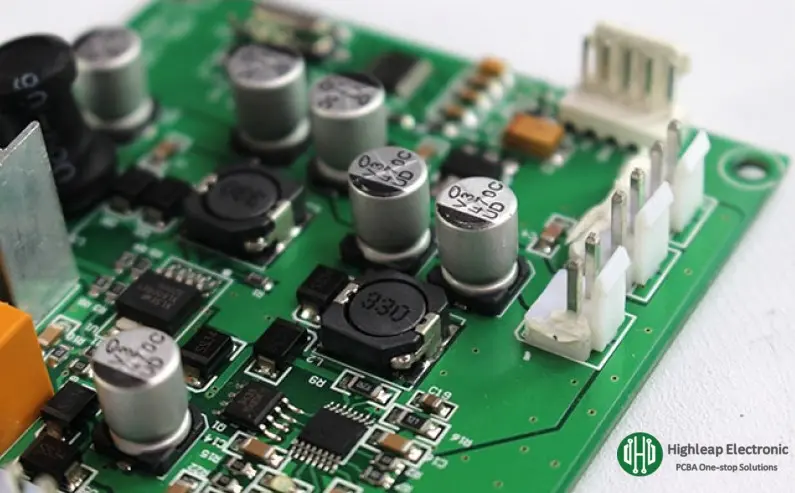Back to blog
PCB Immersion Gold VS Gold Plated Board
What are Gold Plated Boards
Gold Plated Boards represent another significant category in PCB surface finishes. Known for their robustness and exceptional conductivity, these boards play a crucial role in high-end electronic applications. This section delves into the advantages and unique properties of Gold Plated PCBs.
1. The Gold Plating Process
Electroplating Technique: Unlike Immersion Gold, Gold Plated Boards typically involve an electroplating process. This involves using an electric current to deposit a thicker layer of gold onto the PCB.
Thicker Gold Layer: The thickness of the gold layer in this process is significantly greater than that of Immersion Gold, offering different benefits and characteristics.
2. Advantages of Gold Plated Boards
Superior Conductivity: The thicker gold layer provides excellent conductivity, making these PCBs ideal for high-frequency applications.
Enhanced Durability: The robust gold plating offers increased durability, especially in environments where the PCB is subject to physical wear and tear.
High-Reliability Connections: The thickness and quality of the gold plating ensure reliable connections, particularly important in high-reliability sectors.
3. Unique Properties
Resistance to Oxidation: Gold’s resistance to oxidation is well-known, and the thicker layer on these boards provides superior protection against environmental factors.
Ideal for Edge Connector Applications: The durability and conductive properties of Gold Plated Boards make them particularly suitable for edge connector applications in PCBs.
4. Applications
High-End Electronics: Often used in high-end electronic devices where performance and longevity are paramount.
Telecommunications and Aerospace: Common in telecommunications equipment and aerospace technology, where reliability and signal integrity cannot be compromised.
PCB Immersion Gold VS Gold Plated Board
When selecting a PCB surface finish, understanding the differences between PCB Immersion Gold and Gold Plated Boards is crucial. This section provides a comparative analysis, focusing on key factors such as durability, conductivity, cost, and application suitability.
1. Durability and Lifespan
PCB Immersion Gold: Known for excellent corrosion resistance, ensuring a longer lifespan. The thin gold layer, combined with nickel, offers sufficient durability for most applications.
Gold Plated Boards: Feature a thicker gold layer, providing enhanced wear resistance. This makes them suitable for applications with physical wear, like frequent connector insertions.
2. Electrical Conductivity and Performance
PCB Immersion Gold: Offers reliable conductivity and is suitable for fine-pitch components, thanks to its flat surface. Ideal for high-density and high-frequency applications.
Gold Plated Boards: The thicker gold layer ensures superior conductivity, making them preferable for high-frequency and high-performance applications.
3. Cost Implications
PCB Immersion Gold: Generally more expensive than some other finishes but less costly than thick gold plating. The cost is justified by its reliability and performance.
Gold Plated Boards: More expensive due to the higher amount of gold used. Best suited for applications where the additional cost is offset by the need for superior performance and durability.
4. Application Suitability
PCB Immersion Gold: Commonly used in high-reliability sectors like aerospace, medical devices, and high-end consumer electronics.
Gold Plated Boards: Often used in telecommunications, military, and aerospace applications where durability and superior electrical performance are critical.
Choosing the Right Surface Finish
Consider Your Application’s Requirements
- For PCBs exposed to harsh environments, a robust surface finish like Gold Plated Boards may be preferable.
- If your application requires high-frequency performance, the superior conductivity of Gold Plated Boards might be more beneficial.
Durability and Wear Considerations
- For applications involving frequent physical contact, such as connector insertion, the thicker gold layer of Gold Plated Boards offers better durability.
- In less physically demanding environments, PCB Immersion Gold can provide sufficient durability along with excellent electrical performance.
Budget Constraints
While Gold Plated Boards tend to be more expensive, their longevity and performance may justify the cost in certain applications. PCB Immersion Gold, being more cost-effective, is suitable for a wide range of standard applications.
Industry-Specific Needs
- In industries where reliability and precision are non-negotiable, such as medical or aerospace, PCB Immersion Gold might be the preferred choice.
- For consumer electronics where cost and performance are balanced, PCB Immersion Gold offers an ideal solution.
The PCB industry continues to evolve, with ongoing research and development leading to new and improved surface finishes. Staying informed about these developments will help in making the best choice for future projects.
In conclusion, the decision between PCB Immersion Gold and Gold Plated Boards should be guided by a thorough evaluation of your specific application needs, environmental conditions, and budget. Each finish has its unique advantages, and the right choice will ensure the longevity, reliability, and functionality of your PCBs.
PCB & PCBA quick quote
Related Articles

5 Ways and Benefits of Determining LED Polarity
Simple schematic diagram of LED polarity judgmentProper placement, labeling, and orientation of components on a Printed Circuit Board (PCB) help reduce common issues such as short-circuiting and other electrical problems. Ensuring correct orientation of components,...

Comprehensive Guide to Electronic HS Codes for PCBA
Export PCBAIn the realm of international trade, HS Codes (Harmonized System codes) are crucial for the classification and categorization of goods. Developed by the World Customs Organization (WCO), these numerical codes provide a standardized method for customs...

Chinese Chips: A Comprehensive Guide for Tech Enthusiasts
Chinese ChipsIn recent years, China's semiconductor industry has experienced a significant transformation, establishing itself as a major player in the global chip market. With advancements in technology and substantial investments in research and development, Chinese...
Take a Quick Quote
